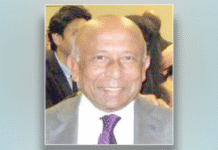M. Shahidul Islam
The dictatorial, one-party rule of Sheikh Hasina has pushed Bangladesh to the brink. Democracy is dead and the economy lies in a coma. Trapped in a geopolitical quagmire and haunted by misguided economic diplomacy, Bangladesh faces the twin dangers of more political and economic upheavals in coming days.
This gratuitous situation is created by wearing the shoe on the wrong foot. To be straighter, the geopolitical void has been created by excessive political dependence on India where very little exports are headed. The economic afflictions, on the other hand, stem from reduced remittance and the prospect of stymied export due to the export-destination countries getting increasingly edgy about the behaviour of Hasina administration.
Wrong choice
Watch carefully where the government is hedging its bets and from where money is flowing. Bulk of the nation’s exports is headed to the USA and the EU. But their repeated urging to resolve the lingering political deadlock by holding an inclusive election is being overlooked with disdain due to tacit Indian and Russian backing behind a one party rule like the one introduced by Sheikh Hasina’s assassinated Sheikh Mujibur Rahman in the 1970s.
Allied to the USA and the EU are countries where Bangladeshi workers dash for earning much needed remittance for the economy. These countries include the KSA (Saudi Arabia) and other Gulf Cooperation Council (GCC) nations, and Malaysia in the Southeast. Regimes and the people of these Muslim-predominant countries have not viewed the AL regime’s disproportionate tilt toward Moscow and India; none of which neither buy much of Bangladeshi products, nor hire its workers.
The USA is Bangladesh’s major trading partner and has been persistently hammering on good and representative governance which the virtually uncontested election of January 5 had belied. Cumulative trade with the USA, until September 2013, stood at $5.038 billion in export and $665 million in import. Remittance from the USA and Canada has also climbed to over $2 billion officially. Unofficial data pegs the figure higher.
Like the USA, the EU has also been equally persistent in its demand for holding an inclusive election in Bangladesh. Unlike India or Russia, Bangladesh’s export to the EU increased 69 per cent since 2008, totaling €9.212 billion in 2013. The EU is the largest trading partner of Bangladesh, accounting for over 12 percent of Bangladesh’s total trade. It’s curious, as the Economist magazine has pointed out, the government of Sheikh Hasina is more responsive to, and beholden by, India.
The road to Moscow traverses through Delhi, according to sources. That too seems circuitous and irrational. Bilateral trading with Russia is as yet at the minimum level; two-way trading accounting for only $700 million in 2013, although Russia has granted $1 billion loan to purchase arms and promised to provide nuclear technology for power generation. The nexus is a geopolitical one which is not viewed kindly by the USA.
Remittance source
The importance of the KSA and other Middle Eastern counties lay in the volume of remittance inflows into Bangladesh. The KSA alone accounts for almost 35% of the $14 billion remittance kitty while the USA and the UK hold the third and the fifth positions, respectively. Malaysia accounts for less than 3% of total remittance, as of now.
In global politics, NATO member states and the GCC countries often act in concert. Recent trends in manpower export to these countries have been negative, or almost stalled. It’s time to see if the correlation is hinged on government’s oppression of the opposition within and disrespect toward the will of those seeking installation of a pragmatic and representative government from without.
The GDP growth has already decelerated for the second year in a row, diving below 6 per cent, while over half of the labour force remains employed in the agricultural sector where growth has further decelerated by 2.2 per cent. Worst is the once thriving service sector where growth plummeted by 6.1 per cent due to incessant strikes and political violence. It’s being feared that the over $22 billion garment export industry will face its mortal challenge in 2014-15. Much of the 2013 earning in the RMG sector came from previous orders. New orders are few and far between, according to manufacturers and suppliers. The RMG foundation has also been battered by sabotage, labour unrest, arson and rampant closure of factories.
This is bad news. Over the preceding decade, Bangladesh economy has been transformed into a remittance and export based one; the two sectors accounting for nearly half of the GDP and the RMG alone fetching over 80% export earnings. The value-added dividend from remittance, however, is much higher than earning from RMG export where over 60% of gain is lost in back-to-back import and allied expenses. Although precise and reliable data is hard to get, a 14 year old research revealed workers’ remittances constituted 4.2 percent of GDP, 29.7 percent of exports, 12.4 percent of external debt, 69.3 percent of FDI, 23.4 percent of gross domestic savings and 21.6 percent of imports. These figures must have gone up phenomenally by now.
Research also shows a 10% increase in remittances as a portion of GDP leads to about 0.9% to 1.2% increase in growth of output. Countries like Bangladesh, the Philippines, and Tajikistan derive over 10-15% of their GDP from remittance. No wonder the impact of remittance source nations on foreign policy formulation of these nations has been remarkable.
Reserves and inflation
Lingering political unrest has stalled investment, reduced imports of machineries, but beefed up reserve of foreign currencies to over $18 billion; mostly coming from remittance and other external aid-grant-related sources. The decision of the government to spend a chunk of the reserve to build the Padma bridge, for which the World Bank stalled funding in June 2012 following detection of corruption, will increase inflation due to money received from remittance having been spent once by circulating Taka.
Food price is soaring in the 162-million-strong nation where January’s inflation rate was already 7.50 percent, up from 7.35 percent in December. Job creation remains frozen amidst reduced domestic investment and foreign direct investment (FDI) remaining only in promise and paper. In 2013, about $1.61 billion in FDI offer was registered, which is paltry in comparison to other regional economies. This too may not be pumped into the economy unless stability returns. Return of 1000s of workers each month from abroad is adding more pressure on availability of employment within.
The India factor
These realities must convince the Hasina regime to put the fingers where the mouth is. India is a big neighbour, but it’s relevance in economic terms is often negative. India’s total export to Bangladesh surpassed $6 billion in 2013. Illegal imports added, the volume is considered to be double of this amount. To the contrary, export to India is yet to reach even $600 million. This data shows India is using Bangladesh as a major market to conduct big businesses; undue geopolitical advantages, blocking of commonly shared waters and killing of innocent Bangladeshis at the borders notwithstanding.
Despite modest stability in the latest balance of trade scenario (2013 export being worth $26.56b against $33.57b import), imports from India, which are immutable consumer goods, shall be curtailed further by promoting substitute domestic production to make the economy sustainable in the long run.
If not, a major economic upheaval will dawn sooner amidst reduced remittance, stymied export and further domination of internal economic activities by known and unknown Indian companies and individuals. This will happen in the midst of another bruising political crisis centering on holding an inclusive election sooner. (globalreview.ca).
Source: Weekly Holiday










Good writing. Bangladeshis should wake up and shake Hasina. She is only securing her position and wasting Bangladesh. She has to go to India and live there forever.